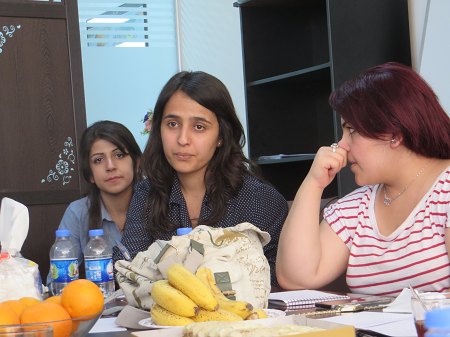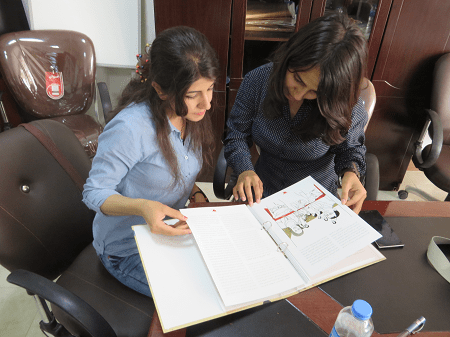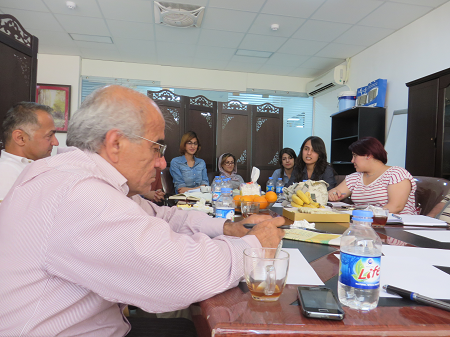In 1992, the people in Iraqi Kurdistan elected a parliament for the first time, since 2005 they do so every four years. On the national level democratic structures are well established by now. Not so on the communal and societal level. In schools, universities and companies the election of respresentatives is unknown. The last municipal elections took place in 2000. In the Syrian part of Kurdistan, democratic forms and organisations are only forming now for the first time. Together with the European Center for Kurdish Studies, WADI has developed materials and workshops in order to aquaint people with possibilities of local democracy and discuss forms of engagement.
Democratization starts at the local level. If it doesn’t work there, it doesn’t work at all. Recent observations of the situation in Iraq, Egypt, Libya, and Tunisia respectively have shown that one structural problem of dictatorships is that there is no inclusion of citizens in decision-making processes at the local level. While some systems allow municipal councils to function, the decision making power lies with the governor who is installed by the national government. Therefore, the communal structures are not well developed: Councils meet, if at all, to nod a decree through.

During the »Arab Spring« revolutions activists created numerous informal and local councils that assumed responsibilities for civil-society tasks. Most activists had no prior experience building democratic structures. They were soon confronted with the limitations to their knowledge regarding these alternative structures. This inexperience made it easier for the new rulers to ignore the prime movers of the revolution and reestablish centralized structures.
In the constitution of the Autonomous Kurdish Region of Iraq, communal parliaments do have more extensive rights, however, this is often not know by the people or even those in the council. Also the election of representatives in schools, universities and companies would in theory be possible. Yet, where people don’t know their rights, these possibilities are not tapped.
In the Kurdish regions of Syria a vivid civil society has developed in the slip stream of the civil war in recent years. This is a good base to build sustainable communal and societal democracy. Yet, here as well, there is danger that the majority party PYD will silence local democratic structure standing in the way of her interests – even if the current party rethoric encourages basic democracy. However, when people have started understanding and making use of their rights, it will be hard for any party to monopolize power once again.

Local democracy supports empowerment of women
Communal and societal democracy also increases the possibilities for women to get involved in political processes. Family responsibilities and conservative values often stand in the way for women to get engaged in politics in the far away capital. If more decisions are taken locally, more women can take part. Therefore, in the sense of the UN resolution 1325 which calls for higher participation of women in conflict resolution, instead of bringing women to the decision makers, decisions need to be brought to the women.
If a common understanding exists that each individual is a citizen who has the ability to influence communal democratic life, the foundation for a tolerant, democratic community is made, which is also able to change patriarchal communal practices and politics. If in society decisions are taken openly and on equal footing, authoritarian and mysogynist behaviours in the family will be questioned soon.
Within the project “From Subject to Citizen” by WADI and the European Center for Kurdish Studies, activists, teachers, officials and politically interested people in Syria and Iraq learn how democratic organisation is possible on the local level. We’ve prepared a number of suggestions as to how parties, unions, schools, universities, or associations could be structured to help promote the participation of party members, employees, students, and parents in decision-making and opinion-forming processes. A humorous cartoon film and several texts adding up to a folder explain the concept of local democracy, specific organisational forms and electoral systems. Both are available in Arabic and Kurdish.

We regularly supplement texts on the basis of feedback from Syria and Iraq, they can be found at: http://local-democracy-for-syria.org
For workshops and town hall meetings in Northern Iraq, 1000 copies of the folder were printed in Kurdish. These were also distributed to local politicians, members of parliament, officials, journalists and teachers.
“lack of any feeling of responsibility for their surrounding”
To implement the workshops and discussions, four local democracy teams were trained in the provincial capital Suleymania and the communites of Halabja, Kalar and Ranja. The teams consistes of young women and men who had already been politically active, e.g. in human rights organisations. After being trained on UN resolution 1325, democratic and peaceful communication and communal democracy, they started out with condcuting two surveys.
The first survey asking about the knowedge on communal democracy among students supported the original assumption: Most of those questioned had no knowledge about possibilities of democratic participation. As one of the activists conducting the interviews summed up: “I recognized the lack of any feeling of responsibility for their surrounding among the students. They think that talking about the process of establishing a democracy is a matter related to politics and there is no need for them to be involved in. They have an unnecessary fear to participate in activities or raising their voices on any issue.”

In a second survey the actvists asked about possibilities for women, young people and the elderly to participate. The results of these two surveys were presented in town hall meetings of the respective cities. In the vivid discussions it became clear that also among the participants of these meetings little was known about possibilities of local democracy.
Journeys to Turkey
To strengthen to regional cooperation within the Kurdish territories and to exchange experiences with democracy, the Iraqi local democracy teams travelled to the Turkish city of Diyarbakir (Kurdish: Amed) in Febuary 2015. They visited a number of institutions of communal self-government as well as the children’s parliament, the women’s academy, a culture center and a party youth organisation. In May, three team members travelled to Diyarbakir again to particiapte in the conferecen “Reconstruction of Kobane”.
The project is supported by Hivos, Oxfam and the German Institut for Foreign Relations.
